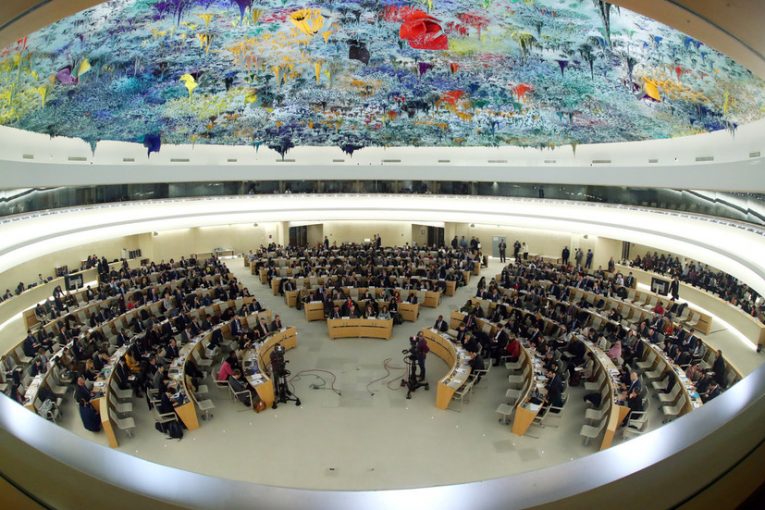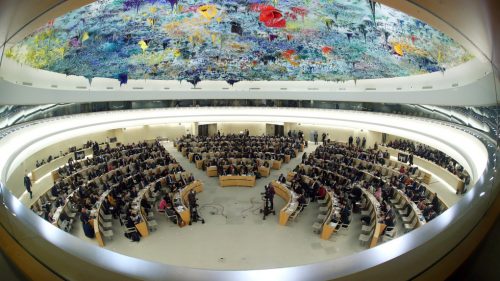

By Leila Katibah
GENEVA, SWITZERLAND – The American Civil Liberties Union and Human Rights Watch have published a report suggesting the United Nations Committee on the Elimination of Racial Discrimination urge the U.S. government to take immediate, tangible measures to dismantle structural racism in the U.S.
In 1994, the U.S. ratified the International Convention on the Elimination of All Forms of Racial Discrimination. The anti-racism convention prohibits government actions that have a racist purpose, intent, effect or impact.
Thirty years later, last week, the U.S. appeared before the committee in Geneva, Switzerland, for a review of its compliance with the convention.
In their report, the ACLU and Human Rights Watch detail U.S. policies that have disproportionately harmed non-white racial groups, particularly Black Americans. They say these policies have led to mass incarceration, police and immigration law enforcement killings and abuse, and discriminatory practices within education, public health, and reproductive rights.
The negative effects, the groups said, of these policies include the wealth gap, in which the average white family has eight times the wealth of the average Black family, Black people being imprisoned at three times the rate of white people, and police killings of Indigenous, Latinx, and Black people at a 350 percent higher rate than white people.
They also found discriminatory practices in the enforcement of U.S. immigration laws, such as the U.S. criminal re-entry statute, found by a federal judge to have been “enacted with discriminatory purpose.”
Approximately 39 percent of the American homeless population—580,000 people—is Black, despite Black people comprising only 12 percent of the population, the ACLU and HRW note, and they state drug usage remains at similar rates for white and Black people, yet Black people are arrested at five times the rate of white people.
ACLU and HRW also refute the report the U.S. government submitted to the U.N. anti-racism committee in June 2021 where the U.S. claimed progress.
In their report, the groups outlined the ways the U.S. government fails to uphold its obligations under the anti-racism convention while also recognizing some improvements and providing a roadmap for the executive branch to take to rectify these failures and ensure compliance. 
Some suggestions the ACLU and HRW developed include the abolition of the 13th Amendment, abolition of the death penalty, reducing the role of police in addressing social problems like homelessness or mental health, gradual abolition of immigration detention, decriminalization of drug possession, investing in crime prevention programs, and more.
In regard to deconstructing racism in education and public health, suggestions include improving the affordability and availability of health insurance, expanding access to free quality education, enhancing benefits of the Pell Grant, federally mandated teaching of historic racist and anti-racist events, federally funded paid family and medical leave, and more.
“Decades after the U.S. committed to end racial discrimination, systemic racism continues to infect our institutions,” said director of the ACLU’s Human Rights Program Jamil Dakwar. “The Biden administration has shown it can name the problem, but the time has come to take bolder action to radically transform these abusive systems and fully implement U.S. human rights obligations.”
President Joe Biden stated systemic racism is “corrosive, destructive, and costly” in an executive order aimed at achieving racial equity in the U.S. He is also the first American president to officially commemorate the 1921 Tulsa race massacre.
However, other than their efforts to acknowledge the problem, the Biden administration has yet to adopt an executive order to create a commission to study the need for reparations and develop specific remedies for the enslavement of people in the U.S. and its detrimental legacy, said the ACLU and HRW.
This commission is also pending before the U.S. Congress in a bill known as H.R. 40 and its Senate companion, S. R. 40.
Dreisen Heath, racial justice researcher and advocate at Human Rights Watch, warns if there is a lack of congressional action to pass the bill, President Biden should establish the commission through executive order.
The joint report was drafted by a team of 10 former legal fellows at Human Rights Watch and the ACLU to honor the legacy of Aryeh Neier, former executive director of both organizations.
Both organizations have a long history of grassroots and movement-based activism to hold the U.S. government accountable for racial injustice. 




